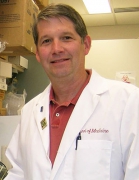About Mark R. Kelley
Dr. Kelley received his B.A. from DePauw University in 1979 and his M.S. (1981) and Ph.D. (1984) from Louisiana State University. He trained as a postdoctoral fellow at The Rockefeller University in New York City from 1984 until 1987 when he joined the Biochemistry Department at Loyola University Medical School as an Assistant Professor. In 1993, he moved to Indiana University School of Medicine as an Associate Professor of Pediatrics and Biochemistry and Molecular Biology and became a full Professor in 1999. He was appointed the Associate Director of the Herman B Wells Center for Pediatric Research in 1995 and still maintains that position. Currently he is the Betty and Earl Herr Professor of Pediatric Oncology Research and Professor of Pediatrics, Professor of Biochemistry and Molecular Biology, and Professor of Pharmacology & Toxicology. He is also the co-program leader of the Experimental Therapeutics Research Program of the Indiana University Cancer Center.
Dr. Kelley's main area of expertise is in DNA repair, particularly DNA base excision repair and translational applications of this area to the clinic. He was one of the first investigators to demonstrate that some ribosomal proteins also have DNA repair capabilities. Recently he has focused more specifically on the role of the major apurinic endonuclease DNA repair enzyme in cancer, both as a diagnostic and therapeutic factor and has obtained a number of patents pertaining to the detection and therapeutic usefulness in the intervention of this enzyme in cancer cells. He has also been using various members of the DNA base excision repair pathway in gene therapy paradigms to either protect normal cells, such as bone marrow, or kill tumor cells depending on which repair enzyme is overexpressed in the cells. He has also shown that one can make chimeric repair proteins, which as fully functional when expressed in cells. This finding is also the subject of a successful patent application. Another unique area he is currently investigating involves the targeting of DNA repair enzymes to the mitochondria in order to protect the mitochondrial DNA against oxidative DNA damage. Furthermore, by targeting promiscuous DNA repair proteins to the mitochondria he has shown that this leads to increased cell killing which can be used as another gene therapy approach to tumor cell killing.
Dr. Kelley is a member of a number of professional organizations and editorial boards including American Association for Cancer Research, American Society for Gene Therapy, Environmental Mutagen Society, American Association for the Advancement of Science, Journal of Pharmacology and Experimental Therapeutics and Frontiers in Bioscience. He has received a number of awards including the Malpas Trust Scholarship, McClure Research Fellowship, National Sigma Xi Research Award, Schweppe Career Development Award and was an American Cancer Society Postdoctoral Fellow. As of 2001, Dr. Kelley has authored or co-authored over 100 scientific articles in peer-reviewed journals as well as numerous book chapters and invited reviews in DNA repair.


